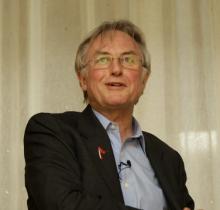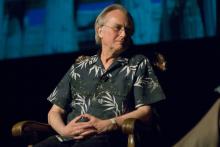The God Delusion

It was 2006’s “The God Delusion” that many credit with sparking a growing interest in atheism in the U.S. Along with best-selling books by the other members of the “Four Horsemen” of atheism—the late Christopher Hitchens, Sam Harris, and Daniel Dennett—Dawkins’ rising star mirrored the growth of atheism in the last decade.
In 2012, the Pew Research Center found 5.7 percent of Americans identified as either atheists or agnostics, up from 3.7 percent in 2007.
“Richard Dawkins has done a lot to bring atheism to a whole new generation,” said Phil Zuckerman, a sociology professor who studies atheism and who also credits Dawkins with speaking out against the pedophilia scandal within the Catholic Church. “On the other hand, Dawkins seems to embody everything that people dislike about atheists: He is smug, condescending and emits an unpleasant disdainfulness. He doesn’t ever seem to acknowledge the good aspects of religion, only the bad. In that sense, I think he doesn’t help atheism in the PR department.”
One of Dawkins’ biggest missteps came in 2011, when he blasted Rebecca Watson, a young atheist activist who wrote about feeling sexually harassed at a freethought conference. In a now infamous series of comments posted to the blog Pharyngula, Dawkins wrote in a message titled “Dear Muslima,” “Stop whining, will you? ... For goodness sake grow up, or at least grow a thicker skin.”

First things first: with all due respect to interim host John Oliver, I for one am thrilled to have Jon Stewart back on The Daily Show. I know it is sad to say, but I actually missed him while he was on summer hiatus. Welcome back, little buddy!
Last night, Stewart interviewed Richard Dawkins, author of The God Delusion, who was promoting his newest title, An Appetite for Wonder. The most interesting moments in the interview revolved around Stewart’s question to Dawkins about whether science or religion ultimately would be responsible for hastening our journey down this path of apparent self-annihilation. What followed was a fascinating, if not entirely satisfying, dialogue about the “downsides” of both disciplines.

LONDON — A controversial Oxford University professor billed by many as the world's "most famous atheist" now says he is not 100 percent sure that God doesn't exist — but just barely.
In a 100-minute debate with Archbishop of Canterbury Rowan Williams last week, Richard Dawkins surprised his online and theater audiences by conceding a personal chink of doubt about his conviction that there is no such thing as a creator.
But, to the amusement of the archbishop and others, the evolutionary biologist swiftly added that he was "6.9 out of seven" certain of his long-standing atheist beliefs.